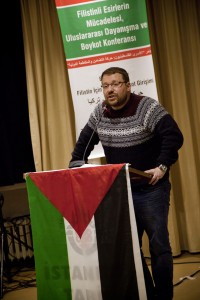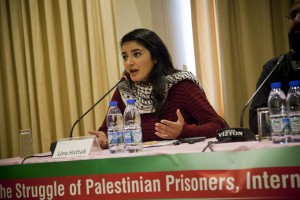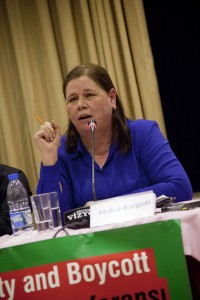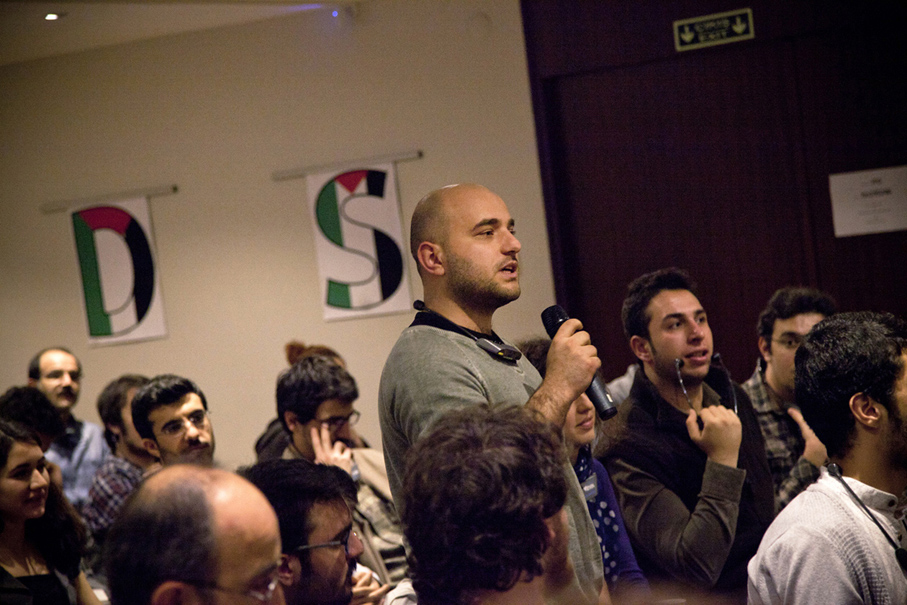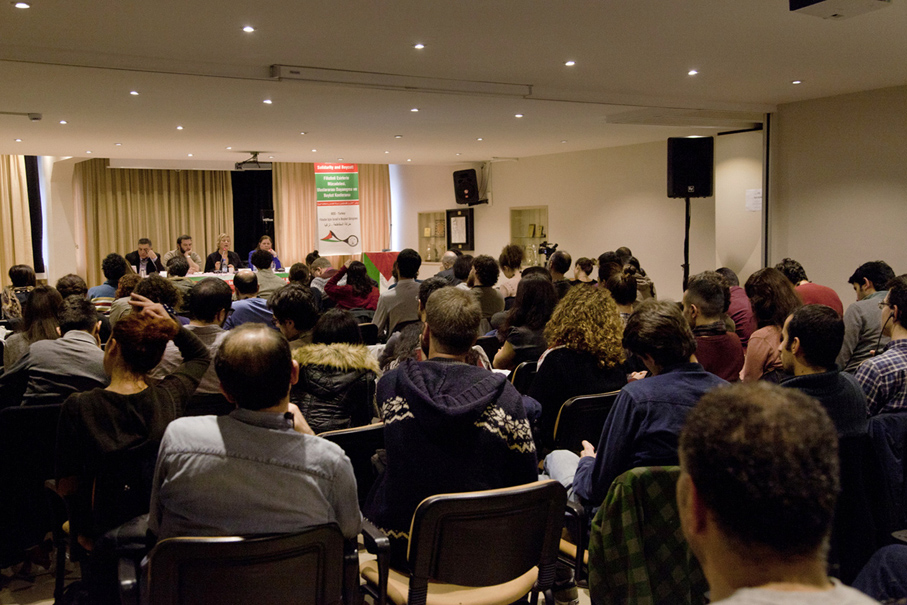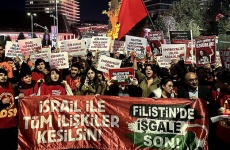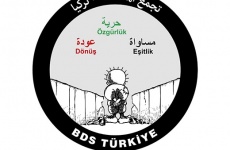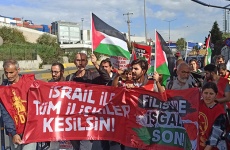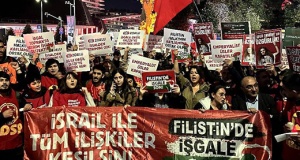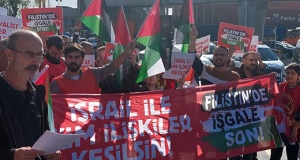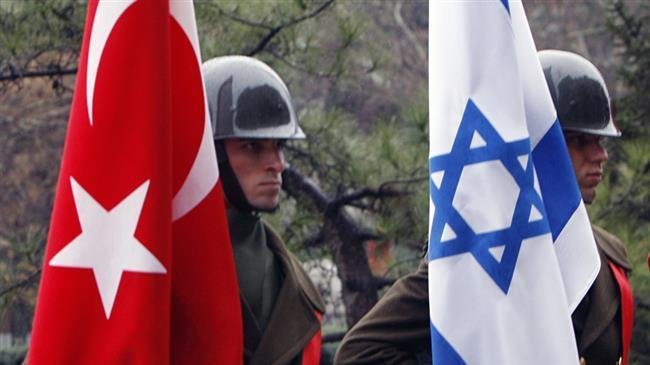Members of BDS Turkey met for the “Struggle of Palestinian Prisoners, International Solidarity and Boycott Conference” on 29 November with the goal of giving a voice to Palestinian prisoners and discussing international solidarity and an effective boycott campaign. At the conclusion of the conference, BDS Turkey announced plans to begin a boycott of G4S, a security company that operates in prisons, checkpoints and settlements in the occupying state
 The Boycott Israel for Palestine Initiative (BDS Turkey) organized an international conference on 29 November at the Istanbul Medical Chamber with the aim of giving voice to thousands of Palestinian prisoners in Zionist jails, debating methods of international solidarity with prisoners, underlining the necessity of an effective boycott campaign and drawing a path of action for Turkey.
The Boycott Israel for Palestine Initiative (BDS Turkey) organized an international conference on 29 November at the Istanbul Medical Chamber with the aim of giving voice to thousands of Palestinian prisoners in Zionist jails, debating methods of international solidarity with prisoners, underlining the necessity of an effective boycott campaign and drawing a path of action for Turkey.
Speaking first on behalf of BDS Turkey, Selim Sezer noted that the conference was being held on 29 November, the “Day of Solidarity with the Palestinian People” – which was first celebrated in 1977 – while emphasizing that attacks against the Palestinian people had been increasing and that the Palestinian people were experiencing a period in which mass arrests had come to constitute part of these attacks.
Taking the floor in the wake of Sezer, Zeina Hamad, a member of the Palestinian diaspora, highlighted popular freedom struggles, noting that “as people who are resisting in Turkey and Palestine, we find our path in the poems of Nazım Hikmet and Mahmoud Darwish.”
‘Daily lives of prisoners even a struggle’
The first session, titled “The Struggle of Palestinian Prisoners,” was moderated by Kutlu Dane. The session’s first speaker was Amneh Muna, who was sentenced to life in prison in 2001 by the occupying powers before participating in a hunger strike to protest solitary confinement in 2007. Muna was subsequently released in 2011 as part of a prisoner swap between Hamas and Israel before going into exile. “I’m going to discuss with you the daily life of the prisoners there, because daily life for the prisoners is even a struggle,” Muna said, noting that she lost everything suddenly and that the struggle started the moment one was arrested.
Relating her experiences during her time in the occupiers’ prisons, Muna said:
“For them, every prisoner is an experiment. I stayed for 11 years, but some comrades were there for 30 years. Torture is especially done during the interrogation period. For one week, you’re on a chair underground without sleep or food. During that time, you learn that your family’s home has been bulldozed. This type of collective punishment is illegal everywhere in the world, but they arrest and punish the whole family. At the moment, 500 children are prisoners. While in prison, your biggest dream is to see your families once more.”
Muna said 45 women were currently being held prisoner in the occupiers’ prisons, while adding that one of the most important aspects for women in the Palestinian freedom struggle was that they were subjected to more oppression in the occupiers’ prisons than men. Despite being sentenced to life in prison, Muna wrote on the side of her bunk, “Tomorrow will be the day of freedom,” noting that this phrase gave her the strength to resist during the years of captivity.
‘Student movement an element of the Palestinian struggle’
Leena Khattab, a student at Birzeit University and important figure of the imprisoned Palestinian students, provided the second speech of the session. During a PFLP rally for solidarity with prisoners on 13 December 2014, Khattab was taken captive and held by an Israeli military court for six months on charges of “throwing stones” and “participating in an illegal demonstration”. Student movements are an element of the Palestinian struggle, Khattab said, adding that Palestinian youths were engaging in a struggle to protect their rights at university.
Telling participants about her experiences under arrest and the conditions in jail, Khattab said:
“I was arrested during a rally to protest the conditions of Palestinian captives. You’re alone underground in a dark, cold, and stinking dungeon. International organizations have to do more work regarding ill Palestinian captives. They are especially deprived of food before court hearings. Other than when they are in isolation, prisoners live a communal life. As a result of our struggle, high-school captives that had not been able to sit exams since 2009 won back their education rights in 2014.”
Noting that the policy of “administrative detention” – a legacy of imperialist states – was being implemented widely in Zionist prisons, Khattab emphasized that Palestinian prisoners were faced with very significant health problems.
‘Palestinian people’s struggle to last as long as the occupation’
The second session was moderated by Mehmet Özgün Özkul on the subject of “International solidarity and boycotts,” first featuring Mahmoud Hassan, a representative of the ad-Dameer Prisoners Support and Human Rights Organization as well as the lawyer of Palestinian parliamentarian and PFLP General-Secretary Ahmed Saadat – himself a prisoner. Hassan said the age of detention had been lowered to 12 in Israel and that the destruction of prisoners’ homes was now being used as a tool of collective punishment. Some 2,000 Palestinians have also been arrested in the last two months alone, he added.
Following Hassan, Fadwa Barghouti, a lawyer, human rights activist and the wife of jailed Palestinian leader Marwan Barghouti, took the floor, noting that the Palestinian people would continue their struggle for as long as the occupation continues and that international solidarity movements kept the Palestinian people’s hopes alive.
“Israel has thrown 800,000 Palestinians into prison up until now – a figure that represents 25 percent of the Palestinian people. We will give voice to Palestinian prisoners everywhere. Regardless of the price, the Palestinian people will not abandon their struggle. As long as the occupation is continuing, no one can ask, ‘Why are you fighting?’ As long as the occupation continues, our struggle will continue.”
BDS Turkey calls for a boycott of G4S
The last speaker, Ayşe Düzkan of BDS Turkey, provided information about resistance movements in prisons in Turkey and around the world while also relating a new campaign to boycott G4S. Hunger strikes became a method of resistance in Turkey particularly after the 12 September 1980 coup against oppression and isolation in prisons, Düzkan said, adding that the biggest expectation for people in prison was for support from the outside. Accordingly, Düzkan noted that the support for Palestinian prisoners from Turkey and around the world, as well as boycott campaigns against the occupying state, were of critical importance.
The G4S security firm has been committing human rights crimes in Zionist prisons in Palestine, as well as similar crimes elsewhere in the world using security as a justification, she said, adding that BDS Turkey was calling for support for its new boycott campaign of G4S.
The conference drew a large number of citizens of Turkey and Palestinians, ending with the reading of a final declaration.
Click here for the full declaration.
bdsturkiye.org


